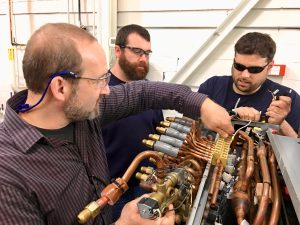
You’ve Decided to Become an HVAC Apprentice…Now What?
 Becoming a HVAC-R union member means job security and financial opportunities for you and your family.
Becoming a HVAC-R union member means job security and financial opportunities for you and your family.
Once you make the decision to move forward, there are two paths to joining the union, based on your prior experience. For trade veterans, you can take a test; for newcomers, you can start a process that leads to membership.
All applicants must be at least 18 years old and a high school graduate with a driver’s license without major violations.
An apprentice is a student, and in the case of the HVAC-R union, has up to five years of training to graduate and become what is known as a journeyman. A journeyman is a commercial HVAC-R technician who has completed training and can work without supervision; apprentices work under the supervision of the journeyman.
Experienced Applicants Take A Test
If you have five years of industry experience, you are eligible to take a journeyman test that assesses your knowledge and skill level based on years in the field. Once the journeyman test is completed, you are placed into the training program based on the results or you can be initiated into the union as a full-fledged journeyman.
If you attain journeyman status, you will be matched with and employed by a contractor that uses union labor.
If you don’t make journeyman status at first, you will become an apprentice and you will be provided training, which is a mix of hands-on learning in the field and time in the classroom.
The union training center runs 10 cohorts, two classes at each level of the five-year program. Apprentice training is scheduled based on experience and availability.
Newcomers Begin 5-Year Program
For those new to the HVAC-R field, the training process is a five-year commitment. There are 9,000 hours of on-the-job training and 1,000 hours of classroom training during that time.
Potential members who have less than five years’ experience can apply for union membership in January. The first step is to obtain and fill out an application. Applications are handed out in the first two weeks of the month on a first-come, first-serve basis at your local union office.
After the application window closes, applicants are given an aptitude test that focuses on reading comprehension and applied mathematics to assess problem-solving and critical thinking. This test takes place in February.
In the month of March, new recruits are interviewed by union personnel and contractors, who could be potential employers. Once the interview process is over, candidates are placed based on their experience in first or second-year classes and connected with contractors for potential employment.
The formal classroom training program begins in August. Classroom time include two days per month at the state-of-the-art Edward R. Gehm Training Center in Hazlet and hands-on training with a journeyman mentor in the field. Classes include 25 students.
Classes Provide State-of-Art Education
Classes are designed to build upon one another and progress from basic commercial HVAC and industrial refrigeration fundamentals to advanced principals and technology. Some class topics include:
- Industrial math
- Electricity
- Soldering and brazing
- Reading and understanding blueprints and drawings
- Safety procedures and OSHA-30 compliance
- First aid
- Different types of air conditioning and refrigeration systems
- Ventilation requirements, air distribution and cleaning systems
- HVAC control systems
- Installation of HVAC and refrigeration equipment
- Troubleshooting and repair of equipment
- Refrigeration basics, including tools and materials
- Refrigerant control systems
- Chemical handling
- Customer relations
- Green initiatives
- Pneumatics
Once you become a union member, you will be a be part of a highly skilled workforce that’s been renowned for product quality, customer service and satisfaction, higher productivity and greater competitiveness for more than 224 years. Members enjoy stable work, pay above the private sector, robust benefits and a sure future where they can retire with a pension. The field is expected to have continued growth for many years to come, especially as Baby Boomers retire, so there is plenty of opportunity for a long, satisfying career.
Click here for more information about applying and you closest Local.
- March 16th, 2018
- Blog
- No Comments




